 Image search results - "minister" Image search results - "minister" |
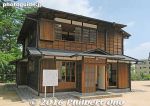
Robert Walker Irwin's summer residence in Ikaho, next to the Stone Steps. He was the Hawaiian Minister to Japan during the late 19th century. He coordinated the immigration of Japanese to Hawaii. ロバート W. アルウイン別邸
|
|

In 1985, the 100th anniversary of the Japanese immigration to Hawaii, Ikaho designated this residence as one of the town's Historic Places. ハワイ王国公使別邸
|
|

This modest building is only part of what was a larger complex of Irwin's summer residence. This is the front entrance. Open to the public, free admission.
|
|

Robert Walker Irwin's summer villa was moved to its present and original location in fall 2013. Map here.
|
|

If the house is boarded up like this, it's probably closed. The Irwin house is closed on Tuesdays.Getting here: From the Buster Shinjuku bus terminal at JR Shinjuku Station (near South Exit) in Tokyo, there are JR buses to Ikaho, taking 2.5 hours. Get off at the Ikaho Ishidangai stop (伊香保石段街) at the bottom of the Stone Steps. Day trippers can store luggage in the nearby lockers. Irwin's villa is a short distance up the Stone Steps on the right side.
|
|
|
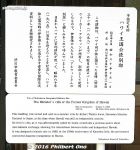
About the "Minister's Villa of the Former Kingdom of Hawaii" ハワイ王国公使別邸 (英語がちょっと変)地元の子供達の英語教育を担当している教育委員会の英文は特にしっかりしたものにして欲しいですね。こんな英語で手本にもならないし、英語の勉強にもならない。読む外国人さんも笑わせる。
|
|

The Irwin house and museum are open 9 am to 4:30 pm (enter by 4:15 pm). Closed Tuesdays and Dec. 28–Jan. 4.
|
|

First floor of Robert Walker Irwin's summer residence in Ikaho. When the house was moved, it was disassembled and repaired before reassembly.
|
|

This first floor originally had tatami mats. You still need to take off your shoes to enter.
|
|

Robert Irwin spent his summers in Ikaho from when he bought the villa in 1891 until 1925 when he died. It was an inn when he bought it.
|
|

Second floor has tatami mats. The second floor is open to the public only on weekends and during the hula festival in summer.
|
|

After Irwin bought the house, he fixed it up by reinforcing the walls against earthquakes with diagonal beams.
|
|

After Irwin died, the house was sold to Kodansha, a publishing company, and used for employee training. Eventually, the house was acquired by Gunma Prefecture and later by Ikaho/Shibukawa.
|
|
|
|
|
|

Second floor
|
|

View of garden from second floor.
|
|
|

The Irwin house is on the left, and a small museum called the Guidance Facility is on the right.
|
|

Map of the Irwin Park.
|
|
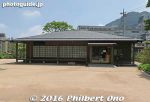
Irwin house Guidance Facility, a small museum showing Irwin artifacts.
|
|
|

Guidance Facility
|
|

The Irwin Guidance Facility has exhibits about Robert Walker Irwin, his Hawaii connection, and his life in Ikaho. A short video introduces him here.
|
|

A young Robert Walker Irwin.
|
|
|

Main exhibits on the left. No English as of July 2016.
|
|

They don't allow photography inside the museum.
|
|

Panel explaining Japan-Hawaii relations.
|
|

Items related to the Japanese immigration and Japanese-Americans in Hawaii.
|
|
|
|

Koa calabash bowl from Hilo, Hawaii to mark Ikaho's 100th anniversary in 1989.
|
|

Various printed matter related to the Japanese immigration and Japanese-Americans in Hawaii.
|
|

Booklet from Lorraine Inouye, then mayor of the Big Island.
|
|

Newspaper article about King Kalakaua's visit to Japan.
|
|

Panel about Robert and wife Takechi Iki.
|
|

Top panel about Robert Walker Irwin. Bottom panel about Irwin and wife Iki.
|
|

Iki and Robert Walker Irwin at the Imperial Palace for the promulgation of the Meiji Constitution in Feb. 1889. ロバート W. アルウインと妻のイキ
|
|

Certificate for the 2nd Class, Order of the Rising Sun, Gold and Silver Star (勲二等旭日重光章) Irwin received on Oct. 4, 1886. But the museum does not have the medal.
|
|

Irwin's decorative saber.
|
|

Wife Iki's belongings. Lower left is Iki's small dagger in a red case. Iki was from a samurai family.
|
|

Wife Iki's belongings. Iki wrote a poem on the upper left fan. Lower right are a few tourist souvenirs (Postcards and hand towel) Iki bought.
|
|

Left panel is about the Irwin family in Ikaho. Right panel is about Sophia "Bella" Arabella, Robert Irwin's eldest child.Bella Irwin established the Irwin Gakuen school and kindergarten アルウィン学園 in 1916 in Kojimachi. Today, the school is in Tokyo's Suginami Ward called Irwin Gakuen Gyokusei Hoiku Senmon Gakko.
|
|

Irwin family portrait and a travel permit that was required for foreigners to travel within Japan.
|
|
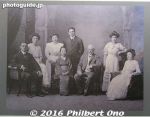
Left to right: Robert Jr., Bella, 4th daughter Agnes, Iki, 2nd son Richard, Robert, 3rd daughter Marion, and 2nd daughter Mary.
|
|

Robert Walker Irwin and oldest daughter Bella. Portrait taken when they visited the US.
|
|

Old 1902 map of Ikaho.
|
|

Old 1902 map of Ikaho with Irwin's summer home marked by the red circle. It was in front of the bottom of the Stone Steps which cuts through the center of the town.
|
|

The upper left is a woodblock print showing foreigners vacationing in Ikaho in 1882.
|
|

Dishes and cutlery used in Irwin's Ikaho residence. Most were imported from Europe and the US. Some are also from Japan.
|
|
|
|
|

Irwin carried these binoculars on walks and also always carried this cross and watch.
|
|

Sake cups with the Hawaiian flag. Gold color substituted for blue.
|
|
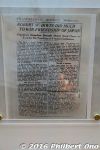
Obituary for Robert Walker Irwin in a Philadelphia Monday Morning newspaper in 1925.
|
|

Letter of condolence from Bella Irwin to the Chigira family written in romanized Japanese. The Chigira family operated an inn near the Irwin summer villa.
|
|

Letter from mother Iki to daughter Bella in 1909 about the Sunday School.
|
|

A few lamps, hibachi heater, and furniture used in the Irwin summer residence.
|
|

Cupboard was a gift from the Chigira family to the Irwins.
|
|

Irwin's furniture.
|
|

Wife Iki's winter coat.
|
|
|

Top panel shows the floor layout of Irwin's original Ikaho summer home. Bottom panel shows pictures of the present house being disassembled
|
|

Floor plan shows the original summer villa in Ikaho. The red portion is the part that remains today. The rest of the building was torn down due to age.
|
|

Behind the museum is a little plaza and the Stone Steps. The plaza has trees.
|
|

Behind the museum, this tree is dedicated to Dottie Thompson, founder of the Merrie Monarch Festival in Hilo, Hawaii (Ikaho's sister city).
|
|

Tree dedicated to Dottie Thompson.
|
|

Near the Irwin villa is a replica of a stone monument at Irwin's gravesite at Aoyama Cemetery in Tokyo. Inscribed with a short biography of Robert Walker Irwin.
|
|
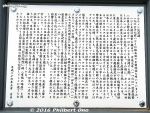
About Irwin
|
|

Steps to the garden below.
|
|

Irwin's summer villa apparently included a garden like this.
|
|
|

Ikaho's sister-city exhibit in Machi-no-Eki building (ropeway terminal).
|
|

Sister-city exhibit for the County of Hawaii (Big Island).
|
|

Letter from Big Island Mayor Stephen Yamashiro proclaiming sister-city relations with Ikaho (before it merged with Shibukawa).
|
|

The following photos (watermarked "2008") of Robert Walker Irwin's summer residence were taken before it was moved to its present location.
|
|

In 1985, the 100th anniversary of the Japanese immigration to Hawaii, Ikaho designated this residence as one of the town's Historic Places. ハワイ公使別邸
|
|

This modest building is only part of a larger complex of Irwin's summer residence. This is the front entrance. Note that this residence has moved slightly up the Stone Steps in fall 2013.
|
|

Rear view of Irwin's summer residence. This building has moved to a new location up the Stone Steps and these photos show it at the previous location at the foot of the Stone Steps.
|
|

This inn called Kanzanso has been torn down to make way for the relocated Irwin house.
|
|

Kanzanso, an inn fronting the bottom of the Stone Steps and where Irwin's summer estate was located. (No longer in existence.)
|
|

Foyer of the Irwin summer house. A US flag, but no Hawaiian flag...
|
|

Main room of the Irwin summer house. When these photos were taken, the house served as a museum. However, in April 2014, a new Guidance Museum next to the relocated house opened to display these artifacts. The house has no exhibits now.
|
|

The first display case on the right shows a chronology of Irwin's life and portraits of him and his wife Takechi Iki.
|
|

Portrait of Robert Walker Irwin and with his Japanese wife Takechi Iki who was from a samurai family.
|
|

On the top right is a letter from Hawai'i's Governor George Ariyoshi (next image). The lower right are rocks from Kilauea volcano, and the left are souvenir ribbons marking the 100th anniversary of the first Japanese immigration in 1868.
|
|
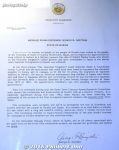
Letter from Hawai'i's Governor George Ariyoshi thanking Ikaho for preserving Irwin's summer home.
|
|
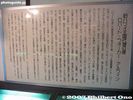
The next display case includes this panel explaining Irwin's activities as Hawaiian Minister to Japan.
|
|

The display case includes photos of the Irwin family in Ikaho.
|
|

At center top and bottom are copies of Irwin's marriage applications. Bottom left is a news clipping announcing Irwin's marriage to Iki. Top right is a photo of the Irwins in Ikaho.
|
|

Top left is a photo of four of Irwin's children in Ikaho. Top right is a photo of Irwin and his children in Ikaho. Bottom left is a postcard addressed to Irwin in Ikaho. Bottom right are Ikaho postcards bought by Irwin.
|
|

Photo of of four of Irwin's children in Ikaho. The building on the right is apparently the building that remains today.
|
|
|

The display case shows an old map of Ikaho Spa on the upper left.
|
|

Old 1902 map of Ikaho with Irwin's summer home marked by the red circle. It was in front of the bottom of the Stone Steps which cuts through the center of the town.
|
|
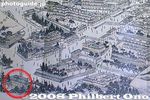
1902 map close-up showing the location of Irwin's summer home (red circle) in Ikaho. It was right in front of the bottom of the Stone Steps.
|
|

The upper left is a woodblock print showing foreigners vacationing in Ikaho in 1882. On the right is a souvenir from Ikaho that Iki bought.
|
|

Panel explaining the Japanese immigration to Hawai'i.
|
|

Copy of a Japanese immigrant's labor contract dated Jan. 11, 1900. (Not for Kanyaku Imin.)
|
|

Various printed matter related to the Japanese immigration and Japanese-Americans in Hawaii, including a booklet from Lorraine Inouye, then mayor of the Big Island. Koa calabash on the right from Hilo, Hawaii to mark Ikaho's 100th anniversary in 1989
|
|

Panel explaining Japan-Hawaii relations.
|
|

Dishes and cutlery used in Irwin's Ikaho residence. Most were imported from Europe and the US. Some are also from Japan.
|
|

On the left are table cloths bearing Irwin's family crest. In the middle is Irwin's binoculars, cross, and watch. On the right are cuff links and cups with the Hawaiian flag.
|
|

On the left is a winter coat worn by wife Iki. A few lamps, hibachi heater, and furniture used in the Irwin summer residence also displayed.
|
|

Veranda with a life-size Irwin cut-out.
|
|

Veranda
|
|

Panel showing Irwin's paternal family tree.
|
|

Upper left is a Japanese letter from Bella Irwin written in roman letters. Upper right is an obituary for Robert Irwin in a Philadelphia newspaper. On the bottom left are condolence telegrams from Ikaho to Bella. Bottom right is get-well letter to Robert.
|
|

Ink stone and brushes used by wife Iki.
|
|

Bella Irwin established the Irwin Gakuen school and kindergarten アルウィン学園 in 1916 in Kojimachi. Today, the school is in Tokyo's Suginami Ward called Irwin Gakuen Gyokusei Hoiku Senmon Gakko.she
|
|

Upper left is a New Year's postcard to Robert. Lower left is a funeral notice for Iki. Upper right is a family portrait.
|
|

Family of Robert Walker Irwin. Left to right: Robert Jr., Bella, 4th daughter Agnes, Iki, 2nd son Richard, Robert, 3rd daughter Marion, and 2nd daughter Mary.
|
|

Upper left is a photo of the Hawaiian Minister's residence in Tokyo. Lower left is a pamphlet of the Mitsui Club at the minister's residence. Upper right is a portrait of Irwin and Bella in the US.
|
|

Panel explaining Bella Irwin's Christian Sunday School.
|
|

Upper left is a letter from Yukiko Irwin, Bella's niece. Upper right are hymns used by Bella's Sunday School. Photo below shows Yukiko Irwin (daughter of Robert Irwin's 2nd son Richard) visiting Ikaho in 1979, meeting with a cultural property
|
|

Letters to Bella from her Sunday School students. Lower right is a chronology of Bella's life published by her school. Her name "Irwin" is rendered in kanji characters pronounced "Ari-in." 有院
|
|
|
|
|
|